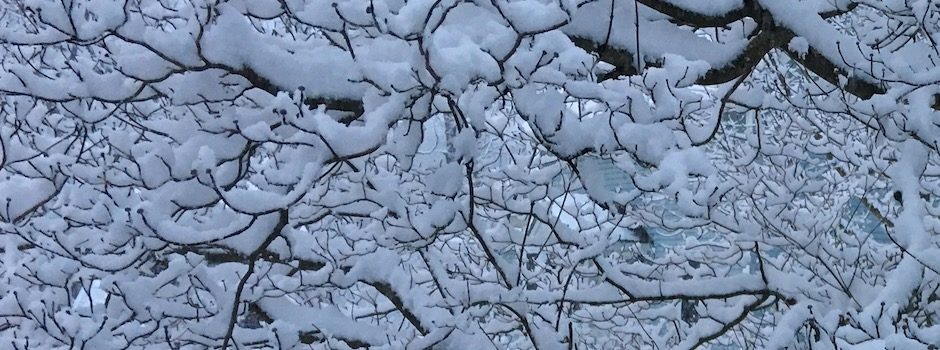If you wish, you can hear this sermon as it was preached in the pulpit of the United Church of Jaffrey. Simply click to the play button below.
Delivered to the United Church of Jaffrey
January 21st 2018
Mark 1:14-20 | Excerpt from Walden by Henry David Thoreau
Every winter the liquid and trembling surface of the pond, which was so sensitive to every breath, and reflected every light and shadow, becomes solid to the depth of a foot or a foot and a half, so that it will support the heaviest teams, and perchance the snow covers it to an equal depth, and it is not to be distinguished from any level field. Like the marmots in the surrounding hills, it closes its eyelids and becomes dormant for three months or more. Standing on the snow-covered plain, as if in a pasture amid the hills, I cut my way first through a foot of snow, and then a foot of ice, and open a window under my feet, where, kneeling to drink, I look down into the quiet parlor of the fishes, pervaded by a softened light as through a window of ground glass, with its bright sanded floor the same as in summer; there a perennial waveless serenity reigns as in the amber twilight sky, corresponding to the cool and even temperament of the inhabitants. Heaven is under our feet is well as over our heads. — Henry David Thoreau.
The Elusive Snow Shovel

By 2 in the afternoon, it looked like the storm had mostly blown over, so I took my work coat off its nail in the mudroom, clambered into boots, donned hat, located a pair of gloves and headed out.
But my snow shovel was not leaning in its accustomed place on the back porch.
The phrase “its accustomed place” may be a bit optimistic. I suppose it would be more accurate to say “likely spot” — of which, of course, there are several.
One of my dearest — and most messy — friends, whose house is perpetually an unapologetic disaster area, has a sign on his wall that proclaims:
“A place for everything, everything in its place… somewhere else.”
I enjoy the joke, but I don’t embrace sentiment. I am old school enough to believe there is virtue to be found in the original saying, without the ironical punchline — but, naturally, my success, living up to it, is approximate at best. Cary, the long suffering spouse, never tires of pointing out that there was time when we had at least ten pairs of scissors before someone started making off with them, and they ended up behind the couch or, for some inexplicable reason, buried in the mulch beneath the hydrangeas.
The point is, I couldn’t find my snow shovel.
I looked on far side of the house by the bike shed.
No snow shovel.
I looked in the woodshed where the hoes and pitchforks have been wintering.
No snow shovel.
I looked over by the chicken coop.
No snow shovel.
Could it be in the mudroom?
No.
Did someone put it in the greenhouse?
No.
The front porch of all places?
No.
I came to a standstill in the middle of the backyard.
Hand on hip, I looked about. I could see, imprinted in the freshly fallen snow, a record of my footsteps where I’d moved about my domain, going from likely spots to increasingly unlikely spots in my exasperated quest for the elusive snow shovel.
Far off, the growl of a snow blower could be heard.
Now and then the muffled rush of a car passing on the road…
But otherwise, it was quiet.
The snow had started up again, but not in earnest — these flurries were the storm’s last, half-hearted, whispered asides — the tail end of a mid-January snowfall that was heading northward into the hills.
And there I stood, my intention thwarted, with nothing to do but look around.
Dormancy
Blanketed in new snow, the backyard in midwinter, is a peculiar place — a place of hiding and revelation.
Gravity — the force that never, for a moment, relents exerting its influence on us — has become an artist, painting the world in bold strokes of white.
Our Norway Maple for example, stretches its snow-topped limbs against the gray sky.
The familiar outlines that describe my garden — the rectangles of my raised vegetable beds and the curved swoop of my perennial beds are both hidden and heightened now by snow.
The pressure treated posts that hold up our picket fence now wear funny top hats that lean this way and that.
And in this place, that, somehow, is still my backyard, there is a deep deep resonance that I only need to stop moving to feel.
Quit, for just a moment, all the significant comings and goings that fill human life, and listen to the winter…
And there it is…
A subtle but undeniable pitch
A quiet but pervasive trembling.
A slow, but present rhythm.
It is… dormancy
The pull inward
The conservation of life force that is the very essence of winter.
Thus having prepared their buds
against a sure winter
Writes the poet, William Carlos Williams, in today’s Poetry Corner Poem…
the wise trees
stand sleeping in the cold.
To overwinter and still survive, trees must contend with two challenges: lack of water, and freezing temperatures.
The surface of leaves apparently accounts for much of the water loss in deciduous trees, so dropping their leaves in winter helps trees retain water.
Extreme cold threatens trees when water within the cells freeze. During dormancy, cell membranes transform, becoming more elastic, allowing water to move out of the cells and into the spaces between cells.
Each season in the turning of the year expresses itself by how its conditions gratify or hinder life.
And while warm weather stimulates a more conspicuous coursing of sap, bursting forth of bloom, and “attiring” of trees in their rich summer canopy —
The dormancy that grips the depths of winter, is no less, a profound example of life’s miraculous expression.
And any example of life’s miraculous expression must also be a window into the spirit…
No?
Surely, it is important to speculate about the life of the soul during the warm weather of our lives…
And just as surely, we must consider the life of the soul in midwinter, when, if we are to survive, we must find our inner resources…
And be transformed.
Transformation
Religion, I think, must be critically concerned with transformation.
Religion is about transformation, just as human life — indeed all life — is about transformation.
We are born, but do we remain infants…
No.
The most fundamental reality that defines our lives is change.
Anywhere a child grows up, there is bound to be a door frame with little pencil marks are scrawled on it that record the changes in height of little Joey or darling Lillian.
If we are alive, we change.
But is change the same as transformation?
For our purposes this morning, let us claim the word “transformation” as a religious idea —
Perhaps we can distinguish “change” — the normal physical growth that occurs naturally in an individual, from “transformation” as an internal change that occurs as a response to an encounter with truth.
This internal change — this transformation — that occurs as a response to an encounter with truth is, arguably, what the entire gospel story is about.
The world encounters the truth of the divine, and is transformed.
And I the idea of dormancy — this idea that we find at the heart of the winter season — has significance when we think of transformation.
Why?
Because dormancy is an example of kind of inner transformation that occurs as a response to external conditions.
Dormancy is not a random response. The tree’s internal nature is designed to respond in this way when the weather gets cold.
So this begs the question… Are we like that?
Are we humans hard-wired, as it were, to respond in certain ways when we are confronted with certain conditions?
Or, another way of putting it… do we, upon encountering truth, respond in a manner that reveals something essential about our internal nature?
Yes, I believe we do.
The Language of Family
Take this morning’s gospel lesson, for example.
Like last week’s reading from the gospel of John, this week’s reading also concerns the time, during Jesus’ life, when he is gathering disciples about him.
This week’s passage is from the Gospel of Mark — and as we have come to expect from Mark, the dramatic movement of the scene moves very rapidly.
The new disciples are named, but none of them get to say anything. When they are called, they simply jump up, leave behind everything, and follow Jesus.
But in spite of how quickly everything happens, if we pay close attention, we see something interesting.
Most of the action is centered around Jesus commanding the new disciples to follow and their immediate obedience.
But hear the manner in which all these men are described:
Simon and his brother Andrew
James son of Zebedee and his brother John
All the language that surrounds these men is the language of family. Before they are identified as fishermen, they are identified by their relation — as brothers, and sons.
If cold weather prompts an internal transformation in trees…
Family relation prompts an understanding of divinity among humans.
This is hard-wired into us. It is through the context of human relationship that we are fulfilled, and that we become transformed by God.
When we love our brothers and sisters —
our fathers and mothers,
sons and daughters — we are not just caring for them
We are learning how to recognize the divine…
So that when the time comes to be transformed by the divine, we are ready to drop our nets and follow.
Amen.

